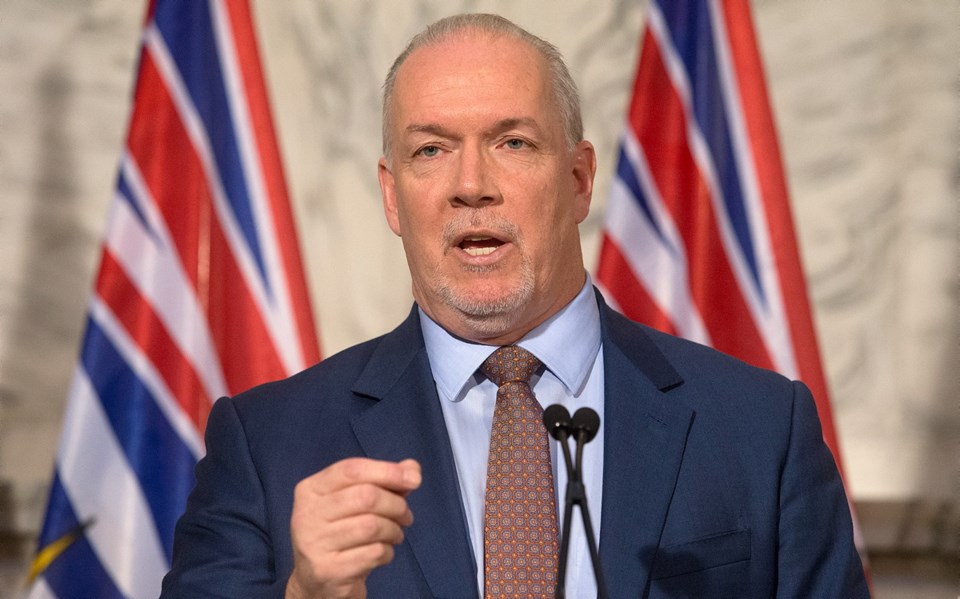 The year 2018 will be as jam-packed with political adventures as 2017 was.
The year 2018 will be as jam-packed with political adventures as 2017 was.
So says Premier John Horgan, who listed a few of them in a news conference Tuesday that preceded his planned departure Saturday for an Asian trade trip.
The Chinese part of the itinerary includes some appearances to promote 2018, the Year of Canada-China Tourism.
(The last time B.C. tourism promotion in China got this much attention was in 2011, when it was discovered — by moi — that buried in a government guide on the topic was a restriction on B.C. promoting “gay tourism” in China. That was a little embarrassing, as it suggested I was the only person to have actually read the thing.)
Horgan will also hit Japan and South Korea in an obligatory mission to meet major trading partners. The futility of the softwood-lumber negotiations with the U.S. adds emphasis to the need to build markets elsewhere. Horgan acknowledged B.C.’s stance on lumber exports to the U.S. shifted this week, with the resignation of David Emerson as a special adviser, and the absence of any replacement.
The former B.C. deputy minister and federal cabinet minister was hired by the former government and retained by the NDP when it took over. But Horgan said Emerson handed in his resignation because he didn’t think he could keep taking the stipend for work he was not able to do.
That confirms the obvious — the desperate national efforts at negotiation are over, and the issue will be now locked up in litigation.
But Horgan spoke highly of Emerson and said he’s working on “finding the next task” for him.
“I’m certain we haven’t heard the last of David Emerson.”
Elsewhere:
• Horgan said B.C. is still working toward, and expecting to meet, the July 1 target date for the legalization of marijuana. But he stressed how much work remains to be done. It’s going to take up a good chunk of the legislative package next spring while his government has a “very, very aggressive agenda” devoted to other issues as well (child care and housing).
• Green Party Leader Andrew Weaver has been agitating for a ban on foreign buyers of B.C. real estate, but the campaign isn’t reaching the premier’s office.
Horgan said: “I just don’t believe that in an open economy that’s an appropriate way to proceed.”
He said the government needs to knock back real-estate speculation by penalizing that behaviour and deal with demand and supply.
But the foreign buyers’ ban often held up as an example — New Zealand’s — doesn’t apply here, he said. “New Zealand is a small set of islands in the South Pacific. B.C. is the gateway to Canada, and I don’t believe we should be curbing people coming here.”
The difference between the two is outside the confidence agreement between the two parties that keeps the NDP government in power, he noted.
• A report on mobility pricing in metro Vancouver — how to tax individual vehicle trips — was released Tuesday, and it prompted Horgan to go for a long skate around the issue in order to avoid addressing it.
The congestion-relieving idea is completely counter to the NDP’s first major move in office — cancelling tolls on some bridges. The concept has to run the minefield of local politics and is years away from coming into force. But just the fact it’s under serious study — by a panel that includes former NDP heroine Joy MacPhail, no less — shows the contrast between the NDP emphasis on affordability and Vancouver’s need to take punitive steps toward more livability.
Horgan said his government is focused on affordability. It’s the mayors’ council that’s entertaining mobility pricing, as a way of raising more money for transit.
“I’ll wait to see what they come up with. … I have not formed an opinion on what those outcomes would be.
“I don’t want to see inconsistent policies coming forward from other jurisdictions.”
Picturing himself in the future as the premier who approved a new tax on every kilometre you drive, or some such thing, he quickly remembered a much more pleasant image. He told reporters about two women who thanked him effusively for cutting medical services premiums in half.
Not much doubt about which scene he preferred.



